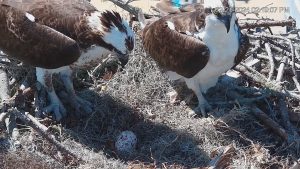Although some may suggest Florida doesn’t have seasons, this is far from the truth. Florida’s seasons influence profound changes in the plants and wildlife that occur here. The month of March means spring is officially here, which means migratory birds will be departing or passing through our state enroute to northern nesting grounds, and some species will be migrating from the Caribbean or South America to nest in Florida. March is also an important time for many resident species to begin nesting, especially owls and raptors.
One of Florida’s native raptors is the osprey (Pandion haliaetus). Ospreys are sometimes referred to as fish hawks because they possess specialized talons and exhibit behaviors that make them expert at catching fish, upon which they feed almost exclusively. Ospreys are a common site along Florida’s coastlines, lakes, and rivers and Florida is reported to have more ospreys than any other state. What few people realize is that in addition to ospreys that live in Florida year-round, there are migratory visitors from both North and South America. Northern migrants come to Florida to escape cold winter months and return to northern latitudes to nest and raise offspring during spring and summer. Ospreys that migrate to Florida from South America do so to nest and raise offspring during Florida’s spring and summer months, returning south during Florida’s winters. Consequently, Florida is home to resident and migratory populations of ospreys from both North and South America.
There is much that could be said about this fascinating raptor and a great source of information is “All About Birds,” a website hosted by the Cornell Lab of Ornithology. And, if you would like to observe a pair of ospreys raising chicks, check out the live the live “Osprey Cam” installed by Dr. Mark Hostetler (Dept. of Wildlife Ecology & Conservation) on the University of Florida campus.
Photograph from the live Osprey Cam (Dr. M. Hostetler).

If you would like to learn more about Florida’s natural world and share that experience with like-minded individuals, then you should consider taking a Florida Master Naturalist Program (FMNP) course. There are multiple courses to choose from, they are offered all over the state throughout the year, and they are open to everyone 18 years and older. Whether you are a novice or an experienced professional, the FMNP has something for you. To learn more about FMNP courses, please see our website (www.MasterNaturalist.org). Consider enrolling in one of the courses being offered during March or one of our future courses, new courses are being continually scheduled. A list of all scheduled FMNP courses can be found on the FMNP Current Courses and Registration webpage. Maybe an FMNP course should be in your future, we are confident that you’ll find FMNP courses very worthwhile!
Testimonials from FMNP graduates:
“Best thing I have ever done. I have learned so much, met so many wonderful people, and found meaningful ways to get involved.”
– Ellen Elliotuote, volunteer
“I’ve seen the elements of prime citizen science come alive in my own classroom after integrating principles and concepts I learned while in the course program.” – Mary Crider, teacher
“FMNP allowed me to move from an enthusiastic volunteer and transition into a professional paid with notable contributions. Worth more than what I could have originally asked for!” – Irene Eva Ries, professional
 1
1
